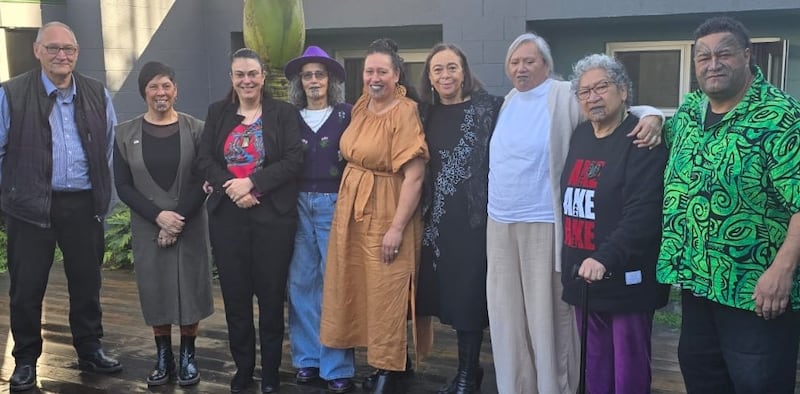Despite the Minister’s claim, she dropped the name Te Puna Aonui, Te Pūkotahitanga formally reclaimed it due to a breach of Te Tiriti and tikanga-based partnership.
Te Pūkotahitanga was an independent Māori ministerial advisory group that provided advice to the New Zealand government on the elimination of family violence and sexual violence.
Co-Chairs Poata Watene and Amokura Panoho affirmed this in a media-standup on June 30.
The decision to reclaim the name was communicated in writing to Minister Karen Chhour on 26 June, a day before the public announcement she was ditching the Māori name Te Puna Aonui.
“These names were not branding assets — they were taonga, gifted with purpose, tikanga, and expectation,” said Poata Watene, Co-Chair of Te Pūkotahitanga.
“When those responsibilities are no longer honoured, we reserve the right to reclaim them.”
The rōpū made clear that the name Te Pūkotahitanga should not be used by any Ministerial Advisory Groups or government agencies without explicit permission. And that Te Puna Aonui may not be used by the Interdepartmental Executive Board or its business unit. They also expect a formal process to retract and remove the names from all government documents and branding.
The three-year term (June 2022 - June 2025) of Te Pūkotahitanga has come to an end with no funding or political support to continue the group.
Minister for Prevention of Family and Sexual Violence, Karen Chhour, is forming a new multi-cultural advisory group with members from different communities, as The New Zealand Herald Reported.
“I need an advisory board that can advise on all issues victim-survivors face, and one that reflects the diversity of our nation, not just the 17% of New Zealanders who identify as Māori,” said Chhour.
The rōpū rejected the suggestion that Māori names or tikanga-based approaches exclude others, arguing instead that by honouring Te Tiriti and upholding Māori solutions, they can create safety and equity for all communities across Aotearoa.
“We uphold tikanga not to exclude, but to ensure solutions reflect the lived realities of the whānau most affected,” said Amokura Panoho, Co-Chair.
“We are not stepping back, we are stepping forward to protect the mana of our mokopuna.”
“The violence in this country is well documented, measurable, and urgent. While the government engages in political theatre, our people continue to suffer disproportionate rates of family and sexual violence,” said Hera Pierce, member of Te Pūkotahitanga.
“We are tāngata whenua. Our commitment to this work transcends political cycles and government support. We will continue to serve our communities... with or without official recognition of funding.”

The history of Te Puna Aonui and Te Pūkotahitanga
Te Pūkotahitanga traces its whakapapa to the Interim Te Rōpū (ITR), established in 2018 by Under-Secretary Jan Logie (Green Party) to embed Māori leadership and kaupapa Māori approaches in the family and sexual violence.
That same year, the Joint Venture under the Social Wellbeing Board was formed to drive a whole-of-government approach to preventing and responding to family violence and sexual violence.
In March 2021, members of ITR met with Minister Marama Davidson and Andrew Kibblewhite, calling for an enduring, independent Māori advisory body that would speak directly to Ministers. In May, ITR published Te Hau Tangata, a strategy that became foundational to the later development of Te Aorerekura, which launched in December 2021.
In 2022, the Joint Venture became Te Puna Aonui, an Interdepartmental Executive Board. The name was gifted by Te Pūkotahitanga, whose own name had also been gifted by the rōpū.
The ten government agencies within Te Puna Aonui were: ACC, the Department of Corrections, the Ministry of Education, the Ministry of Health, the Ministry of Justice, the Ministry of Social Development, NZ Police, Oranga Tamariki, Te Puni Kōkiri, and the Public Service Commission.
Te Pūkotahitanga formally began in June that same year.
Achievements by Te Pūkotahitanga in three years
- Released A Litany of Sound Revisited - a compendium of Māori knowledge and lived experience which highlighted the complexity of violence within whānau and provided culturally-grounded insights to guide systemic change.
- The development of Toiora Whānau Māori Outcomes Framework - a kaupapa Māori outcomes measurement to track the progress of Te Aorerekura, New Zealand’s national strategy to eliminate family violence and sexual violence within a generation.
- Partnered with Te Rau Ora on the delivery of a National Kaimahi Māori Research Report - gathering essential workforce insights to inform strategies for a more sustainable and supported Māori workforce in the sector.
- The growth of Matatuhi, a national Māori practitioner collective.
- A regional wānanga series that amplified the voices of communities to government, capturing regional strengths, challenges, and aspirations. The final report is a resource for future policy and decision-making.



